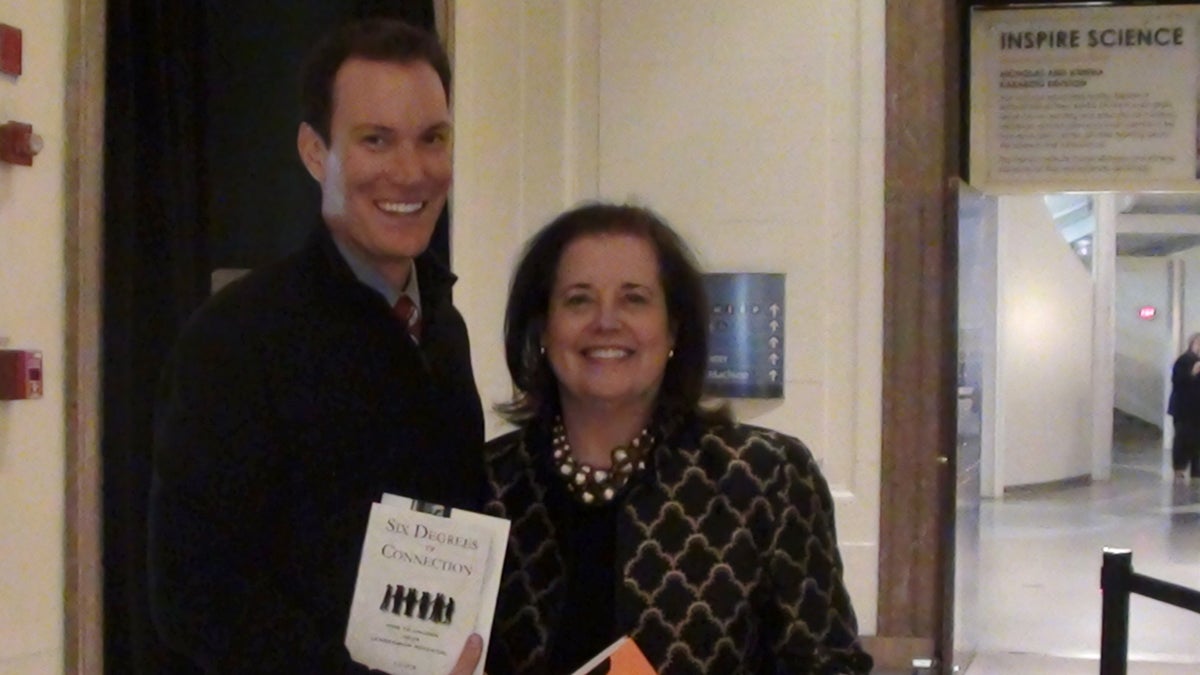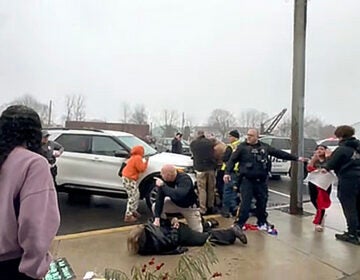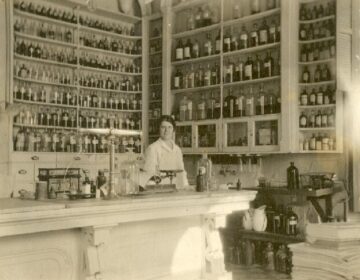The spirit of connecting, when service leads to personal happiness and workplace success

Leadership Philadelphia CEO Liz Dow is shown standing with happiness expert Shawn Achor. (Image courtesy of Liz Dow)
An interview with Leadership Philadelphia CEO Liz Dow reveals a surprising truth about work and meaning for business leaders. “I’m here to teach people to serve,” Dow says. “I believe service is what brings people together and makes them happy.” So she helps teach leaders how to connect with and to serve the community.
I’ve written in this space about what makes work meaningful for people. What fascinates me is how many ways people find to answer that question — usually working the answers out over time in real-life, real-work situations.
A Philadelphia story that I found especially moving is that of Liz Dow and her work as president and CEO of Leadership Philadelphia. The organization was begun around 1960 to bring together city leadership with community affairs. Over time its goal has become to enrich the leadership talent of the private sector to serve the community.
It seemed to me that mobilizing those private sector leaders meant tapping into their sense of meaning, but I wanted to see what it looked like to Dow. When she started at Leadership Philadelphia 20 years ago, she said she remembers observing what was going on in the classroom.
What she saw had a profound impact on her. “What was missing from the lives of these high-level people was a sense of meaning and being valued,” she said.
Dow shifted from the more usual leadership training by expressing a healthy dose of appreciation for them, helping them learn how to better connect with the community, and in doing so, teaching them how to serve that community.
Dow had found what was, for her, the crux of the matter: “I believe service is what brings people together and makes them happy. So it went into the curriculum.”
First, Leadership Philadelphia identified role models for leaders involved in service — not just CEOs and politicians, but also those (be they executives or civic entrepreneurs) who had great passion for both their work and their service. As a result, the teachers gave even greater attention to the clients of those service leaders and what they needed, and in turn, the Leadership Philadelphia participants began to internalize that passion for community service.
That helped Dow bring her work into sharper focus — and to articulate what made it most meaningful for her.
“I always liked the book Pay It Forward,” Dow says. “You pay something forward expecting nothing in return. It’s about connecting, in terms of giving someone what they need for their sake, not for gain.”
Connection as a spiritual belief
Ten years into her tenure, Dow recalls, “I was feeling the need to take our goodness further into the community, beyond the classroom. I read The Tipping Point and understood that people called ‘connectors’ are the ones who know more people and who get things done behind the scenes without getting credit, invisibly, through relationships. They’re people who connect for the common good, more interested in giving credit than getting credit. I realized those are the kind of leaders we need now.”
Dow made it her mission to find, research, and recognize these connectors in Philadelphia and to gather them so that others could learn how to connect in that way.
In 2006, Leadership Philadelphia identified a cohort of the top 101 connectors in the city to start a conversation about leadership, connection and action. Since then, she has developed two other groups: Emerging Connectors (101 young connectors) and Creative Connectors (76 arts and culture leaders). Right now, Leadership Philadelphia is selecting names for a group of Millennial Connectors, the folks Dow sees as “keepers” — those young Philadelphians who the city wants to hold onto.
“I’m here to teach people to serve,” Dow summarizes. “My premise is that we’re all connected, which is my spiritual belief. Showing clients how to be connected helps them serve. On the first day of class, I say I’m here to condemn them to lead a more meaningful life! It’s not the usual old leadership principles. This leadership program is about transforming professionals into service leaders and helping the community. And that is what leads to the sense of meaning and being valued.”
Creating a virtuous cycle
That insight led her to bring in Shawn Achor, founder and CEO of GoodThink, to talk to Leadership Philadelphia alums about how happiness drives success. “It resonated with our operating behavior,” Dow says. “Teaching people to be happy by serving makes them happier. Specific positive feedback helps them feel empowered to serve. And that brings appreciation. That drives success.”
What interested me most was what lay at the heart of her vision, a vision that has shaped the mission of Leadership Philadelphia and altered the local and national conversations about power and change in organizations. That vision basically begins with her belief that people are happier when they serve. It connects them with the community, with each other, and with themselves. When they feel that way, they feel appreciation and meaning, and they reflect it back. And that, in turn, affects the success of their work, both professional and civic.
Sometimes people ask her to describe why she’s there in a single sentence. “I’m here to call people to their higher angel,” Dow says. “I want to empower them to be the best version of themselves.”
That sounds like a great mission statement to me.
—
Susan writes on topics relating to spirituality in the workplace. If you have a question, dilemma or conundrum, email speakeasy@whyy.org, and Susan will answer it in an upcoming blog post.
WHYY is your source for fact-based, in-depth journalism and information. As a nonprofit organization, we rely on financial support from readers like you. Please give today.




